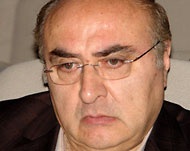Member of the national council of media and information Ibrahim Awad stressed that the Syrian crisis was close to an end, and expressed belief the crisis would not last very long despite everything.
Dark Tunnel in Syria Will Finally See End
Whole World Seeking to Get Rid of Syria
There Are Many Oppositions in Syria, Not One
Reform Process Cannot Take Place in One Day
Syria’s Collapse Will Facilitate American Plan
Syria Will Triumph… Just Like Resistance Did!
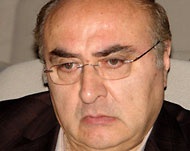 Member of the national council of media and information Ibrahim Awad stressed that the Syrian crisis was close to an end and that Syrians would very soon witness the end of the dark tunnel, and expressed belief the crisis would not last very long despite everything.
Member of the national council of media and information Ibrahim Awad stressed that the Syrian crisis was close to an end and that Syrians would very soon witness the end of the dark tunnel, and expressed belief the crisis would not last very long despite everything.
In an exclusive interview with Al-Manar Website, Awad said that the scene of the July 2006 war was repeating itself in Syria, with some change in details. He noted that the whole world was standing against Syria and besieging the Syrian regime, just like the whole world sought to get rid of the Resistance throughout the July war. He expressed belief that victory would be at the side of the regime which has rejected the American plots.
While stressing there was not a unified Syrian opposition and saying that there were rather oppositions in Syria, he noted that the newly formed National Council did not make any change in this regard. He said he did not find in any opposition figure a potential alternative to the current regime. He renewed calls to give the Syrian leadership further time to achieve reforms, given that the reform process cannot be finalized in twenty-four hours.
ASSAD RESPONDED TO DEMANDS… BUT!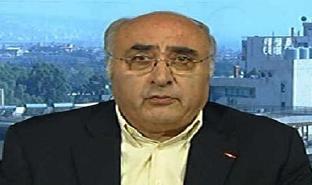 Political analyst and expert Ibrahim Awad told Al-Manar Website that the change in the Syrian crisis revealed that the so-called opposition was not really an innocent and peaceful one calling for reforms and only reforms. He explained that the course of events in Syria showed that at least one part of this opposition was armed, and that it was behind the military operations taking place against the army and security personnel. He also pointed to the opposition’s role in the recent assassinations, including the assassination of the Syrian Mufti’s son, in addition to intellectuals and university professors.
Political analyst and expert Ibrahim Awad told Al-Manar Website that the change in the Syrian crisis revealed that the so-called opposition was not really an innocent and peaceful one calling for reforms and only reforms. He explained that the course of events in Syria showed that at least one part of this opposition was armed, and that it was behind the military operations taking place against the army and security personnel. He also pointed to the opposition’s role in the recent assassinations, including the assassination of the Syrian Mufti’s son, in addition to intellectuals and university professors.
On Sunday, Syrian Grand Mufti Sheikh Ahmed Badreddin Hassoun’s son and history professor Mohammed al-Omar were killed by gunfire from a group of armed terrorists. They were attacked while traveling in the professor's car on the Aleppo-Idlib road in northwest Syria.
Awad recalled that the Syrian leadership has responded to reform demands a few months ago and even lifted the emergency law, despite the fact that similar crises usually force the regimes to impose the emergency law, instead of lifting it. “Yet, President Bashar Assad wanted to show good will, and therefore lifted the emergency law, and worked to achieve other reforms, alongside the government,” he said.
BETWEEN SYRIA’S COLLAPSE AND NORMALIZATION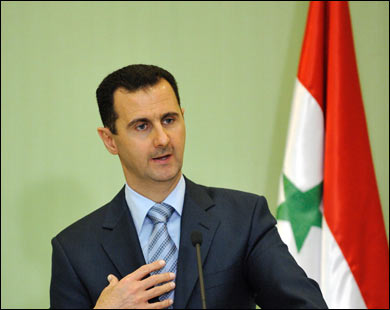 Awad said that the central change in the Syrian crisis took place when the reform slogan turned to “overthrowing the regime.” He pointed to the huge difference between the two slogans, but said that this fundamental change uncovered the truth, and showed that some sides were seeking to create sedition in Syria in order to harm the current leadership. “This required a firm and solid position against the plots of the American administration and its allies in the region, including the Israeli enemy,” he added.
Awad said that the central change in the Syrian crisis took place when the reform slogan turned to “overthrowing the regime.” He pointed to the huge difference between the two slogans, but said that this fundamental change uncovered the truth, and showed that some sides were seeking to create sedition in Syria in order to harm the current leadership. “This required a firm and solid position against the plots of the American administration and its allies in the region, including the Israeli enemy,” he added.
While remarking that Syria was the only remaining state in the region which had the courage to refuse the American conditions, Awad warned that the collapse of such resistant regime would facilitate the implementation of the American plan and therefore, would lead to the normalization of ties with the Zionist entity. He also expressed regret that some so-called Arab regimes were actually seeking reconciliation with the enemy.
REFORM NEEDS TIME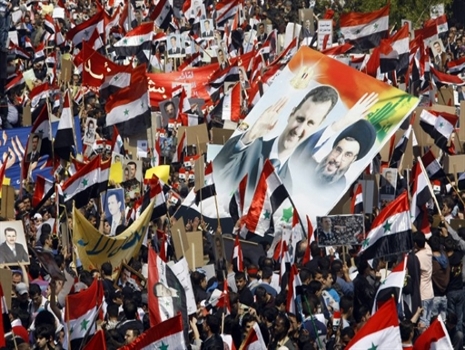 Meanwhile, Awad refused talks of a unified opposition in Syria, and noted that speaking of “oppositions” was more appropriate. He undermined the recently formed Syrian National Council declared from Istanbul, and said it did not unify these oppositions. He pointed to conflicts within the Syrian oppositions which did not signal at all that there could be unified at the current stage.
Meanwhile, Awad refused talks of a unified opposition in Syria, and noted that speaking of “oppositions” was more appropriate. He undermined the recently formed Syrian National Council declared from Istanbul, and said it did not unify these oppositions. He pointed to conflicts within the Syrian oppositions which did not signal at all that there could be unified at the current stage.
Syrian so-called opposition movements announced the formation of a "historic" united front against President Bashar Assad's regime at a meeting in Turkey on Sunday. Among those represented in the Damascus Declaration were former parliamentarian Riad Seif, seen as possibly playing a leadership role if Assad were to fall, and Riad al-Turk, Syria’s top dissident.
While saying he respected all those who called for reform and those who represented a peaceful opposition, Awad said he did not find, until now, in any opposition figure a potential alternative to the current Syrian leadership. He said the regime admitted there was some illness in some place, but launched reforms to deal with it. He noted that reform needed time and “could not happen in twenty-four hours.” He said that preparing a lunch or dinner banquet required preparations for many days. “What about the reform process? It needs more time, without doubt.”
JULY WAR TAKING PLACE IN SYRIA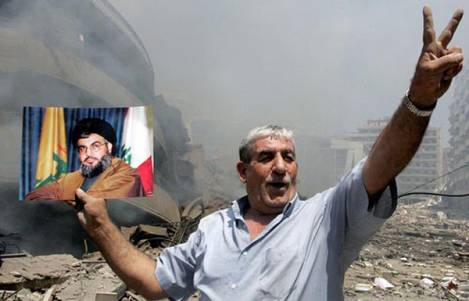 The political analyst noted that what’s happening in Syria was actually similar to what happened in Lebanon in July 2006, in reference to the Israeli fierce war against the country and the Resistance. “At the time, the whole world stood against us. We were able to listen to lots of stances and positions encouraging the war against us, from international and regional sides but also from some local and Arab sides,” he pointed out. “When we say that the whole world was against us, we mean the regimes, not the nations,” he went on to say. “What happened afterwards? The Resistance has triumphed, and Lebanon has achieved victory.”
The political analyst noted that what’s happening in Syria was actually similar to what happened in Lebanon in July 2006, in reference to the Israeli fierce war against the country and the Resistance. “At the time, the whole world stood against us. We were able to listen to lots of stances and positions encouraging the war against us, from international and regional sides but also from some local and Arab sides,” he pointed out. “When we say that the whole world was against us, we mean the regimes, not the nations,” he went on to say. “What happened afterwards? The Resistance has triumphed, and Lebanon has achieved victory.”
Awad stressed that the same scene was repeating itself in Syria, despite some change in details. He noted that the whole world was seeking to weaken the Syrian regime in order to overthrow it. “The whole world is besieging and isolating the Syrian regime, just like they did with the Resistance in 2006, when they were seeking to get rid of it. However, just like they failed in 2006, they will fail in 2011.”
CRISIS CLOSE TO END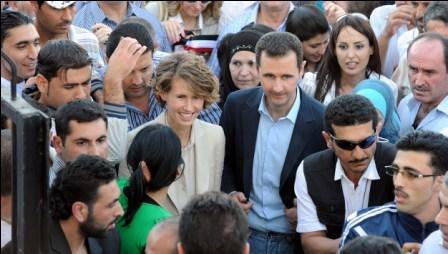 Answering a question on whether the outcome of the July 2006 war would be also repeated in Syria, Awad expressed belief that the “victory would be at the side of the right, at the side of whoever says no to Israel, no to the American precondition, no to weakening the Arab people.”
Answering a question on whether the outcome of the July 2006 war would be also repeated in Syria, Awad expressed belief that the “victory would be at the side of the right, at the side of whoever says no to Israel, no to the American precondition, no to weakening the Arab people.”
Asked whether the crisis would last too long before seeing an end, Awad said he did not see this scenario possible anymore. He noted that, one month ago, he was scared the crisis would take a lot of time. “However, I can assert now that the Syrian crisis has approached its end, and the dark tunnel faced by the Syrians nowadays is close to this end,” he concluded.
